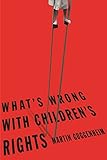What's Wrong with Children's Rights / Martin Guggenheim.
Material type: TextPublisher: Cambridge, MA : Harvard University Press, [2009]Copyright date: ©2007Description: 1 online resource (320 p.)Content type:
TextPublisher: Cambridge, MA : Harvard University Press, [2009]Copyright date: ©2007Description: 1 online resource (320 p.)Content type: - 9780674038028
- 323.3/52/0973 22
- HQ789 .G78 2005
- online - DeGruyter
| Item type | Current library | Call number | URL | Status | Notes | Barcode | |
|---|---|---|---|---|---|---|---|
 eBook
eBook
|
Biblioteca "Angelicum" Pont. Univ. S.Tommaso d'Aquino Nuvola online | online - DeGruyter (Browse shelf(Opens below)) | Online access | Not for loan (Accesso limitato) | Accesso per gli utenti autorizzati / Access for authorized users | (dgr)9780674038028 |
Frontmatter -- Contents -- Preface -- 1. A Brief History of Children’s Rights in the United States -- 2. The Rights of Parents -- 3. Getting and Losing Parental Rights: The “Baby Jessica” Case -- 4. Who Gets to Be the Parent? The Right to Relationships with Someone Else’s Children -- 5. Divorce, Custody, and Visitation -- 6. Child Protection, Foster Care, and Termination of Parental Rights -- 7. Children’s Rights that Serve Adults’ Needs: The Case of Adolescents’ Right to Abortion -- 8. How Children’s Rights Impact Family Law and Juvenile Rights -- Notes -- Acknowledgments -- Index
restricted access online access with authorization star
http://purl.org/coar/access_right/c_16ec
"Children's rights": the phrase has been a legal battle cry for twenty-five years. But as this provocative book by a nationally renowned expert on children's legal standing argues, it is neither possible nor desirable to isolate children from the interests of their parents, or those of society as a whole. From foster care to adoption to visitation rights and beyond, Martin Guggenheim offers a trenchant analysis of the most significant debates in the children's rights movement, particularly those that treat children's interests as antagonistic to those of their parents. Guggenheim argues that "children's rights" can serve as a screen for the interests of adults, who may have more to gain than the children for whom they claim to speak. More important, this book suggests that children's interests are not the only ones or the primary ones to which adults should attend, and that a "best interests of the child" standard often fails as a meaningful test for determining how best to decide disputes about children.
Mode of access: Internet via World Wide Web.
In English.
Description based on online resource; title from PDF title page (publisher's Web site, viewed 30. Aug 2021)


